SUMMARY
This is AI generated summarization, which may have errors. For context, always refer to the full article.
Healthcare workers who contract a mild or moderate case of COVID-19 will be entitled to a cash assistance of P15,000 from the government under the Bayanihan to Recover as One Act or Bayanihan 2, Senator Sonny Angara told Rappler on Friday evening, August 14.
“The President promised that, and many really wanted to give that since the healthcare workers themselves were lobbying for it,” Angara, head of the Senate finance committee, said in a message. He had just come out of the 5-hour virtual session of Congress’ bicameral conference committee on the Bayanihan 2 bill.
The Senate and House of Representatives have different versions of the proposed measure that will extend special powers given to President Rodrigo Duterte under the Bayanihan to Heal as One Act (Bayanihan 1), which lapsed on June 5. The bicameral conference is where lawmakers reconcile the two versions to finalize the proposed measure.
The Bayanihan 1 and its supplement, Bayanihan 2, were meant to enable the government to adequately respond to the COVID-19 pandemic.
Both versions of Bayanihan 2 continue the grant of P100,000 to healthcare workers who contract a severe case of COVID-19, and P1 million to the families of healthcare workers who die of the disease.
On August 1, more than 80 local medical groups asked Duterte to revert Metro Manila and its surrounding provinces to a modified lockdown in order to reassess the country’s “losing battle” with the coronavirus. Among their recommendations was to financially aid healthcare workers, who have been inadequately compensated despite being on the frontlines of the response to the pandemic.
In a televised public address on August 3, Duterte said cash aid for healthcare workers should be included in Bayanihan 2.
The grueling work of caring for the continually increasing number of COVID-19 patients in the Philippines have left doctors, nurses, and other medical industry workers exhausted. It does not help that special allowances and hazard pay promised them do not always reach them on time, or in full.
On July 22, Cainta nurse Maria Theresa Cruz died of COVID-19 after having been in contact with an infected patient. When her daughter Joie Cruz claimed her hazard pay from the Cainta Municipal Hospital on August 10, the deceased nurse’s entitlement of P30,000 – based on the publicized P500 daily hazard pay – was reduced to P7,265 because of technicalities in policy.
After Friday’s bicameral conference, Zamboanga Sibugay 1st District Representative Wilter Wee Palma II said lawmakers are down to defining “what is mild, what is severe, and what is moderate” among COVID-19 cases.
“But yes, there will be some subsidies to [healthcare workers] infected with COVID-19. Naka-depende siya sa classification mo (It depends on your classification),” Palma told Rappler in a message.
The bicameral conference will continue on Monday, August 17, when the committee is expected to tackle the more contentious differences between the bill’s versions: the standby fund for the pandemic response, and the creation of a government venture to resuscitate private firms.
The Senate version of Bayanihan 2 sets the standby fund at P140 billion, while the House version allots P162 billion.
The House version establishes the Accelerating Recovery to Intensify Solidarity and Equity or “ARISE” Incorporated. It is a joint venture between the Land Bank of the Philippines and the Development Bank of the Philippines that would invest in private companies as a way to tide them over the economic slump caused by the coronavirus pandemic. The Senate version does not mention ARISE Incorporated.
During Friday’s session, senators and representatives agreed “in principle” to set bank loan moratoriums to “not exceeding 60 days.” The House version allowed a yearlong grace period for bank loans, but business groups opposed the idea, warning of “unintended adverse consequences.”
The Senate version had allowed only a 30-day grace period for bank loans. – with reports from Mara Cepeda/Rappler.com
Add a comment
How does this make you feel?

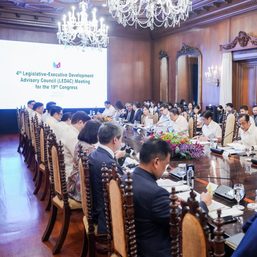
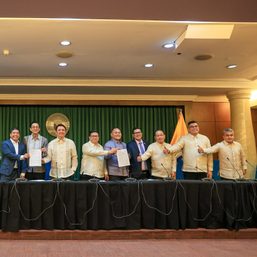
![[New School] Opening closed doors: Why full disclosure on congressional insertions matter](https://www.rappler.com/tachyon/2024/02/20240214-full-disclosure-congressional-insertions-matter.jpg?resize=257%2C257&crop=237px%2C0px%2C720px%2C720px)
![[OPINION] The House strikes back](https://www.rappler.com/tachyon/2024/02/TL-House-strikes-back-February-12-2024.jpg?resize=257%2C257&crop_strategy=attention)


![[Time Trowel] Evolution and the sneakiness of COVID](https://www.rappler.com/tachyon/2024/02/tl-evolution-covid.jpg?resize=257%2C257&crop=455px%2C0px%2C1080px%2C1080px)




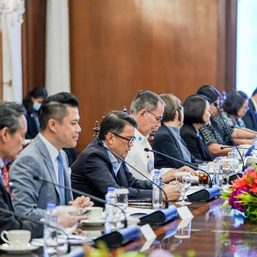
![[OPINION] The First Mode conundrum](https://www.rappler.com/tachyon/2024/03/tl-first-mode-conundrum-03232024.jpg?resize=257%2C257&crop=283px%2C0px%2C720px%2C720px)
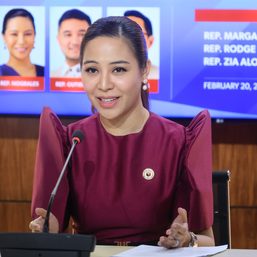

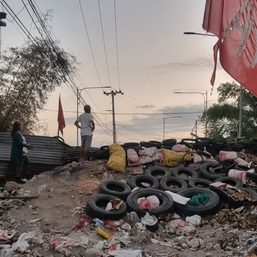

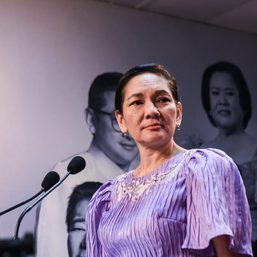
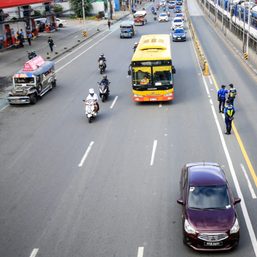
There are no comments yet. Add your comment to start the conversation.